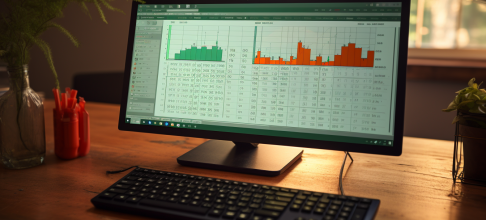From Idea to App: Development Process
Have you ever dreamt of creating your own app but are unsure where to start? This guide’s for you!
We’ll walk you through everything from conceptualizing your idea, designing the interface, learning the coding, and testing its functionality to launching your app.
So roll up your sleeves. It’s time to bring that app idea to life!
Table of Contents
Conceptualizing Your Application Idea

Before you dive into an app development company, you’ll need to conceptualize your application idea thoroughly. Start by identifying a problem the new app needs solving or a service that can be improved. Perhaps there’s a way to make a task more efficient or enjoyable.
Once you’ve got your idea, you must research the market. Are there similar apps out there? What can you do to make yours stand out? This is also an excellent time to identify your target audience. Who will use your app? Understanding their needs will help you design a user-friendly experience.
Draft a sketch of your app, outlining its main features and layout. Remember, the more planning you do now, the smoother the development process.
Designing Your Application
It’s essential to create a user-friendly interface when designing your application. Visual appeal is crucial, but don’t neglect functionality and simplicity. Your app should be easy to navigate, with clear and intuitive menus.
Use wireframes to outline the structure of your app. This blueprint will give you a visual representation of your app’s layout and flow. Remember, every great app starts with a great design.
Consider the color scheme, typography, and imagery. Make sure they align with your brand and the app’s purpose. Test different designs on a small audience for feedback before making your final decision.
Lastly, don’t forget to design for different screen sizes. Your app should look good and work well on all devices. A responsive design is critical in today’s market.
Learning App Coding

Learning to code isn’t just about understanding syntax and programming concepts; it’s a significant part of creating a successful mobile application. It’s crucial to familiarize yourself with the programming language that corresponds to your chosen platform.
For instance, if you’re developing an iOS app, you must learn Swift or Objective-C. On the other hand, if you’re targeting Android, Java or Kotlin would be your go-to languages.
The internet is your best friend for learning these languages. There are countless online resources, including free tutorials and paid courses. Consider platforms like Codecademy, Udemy, or Coursera.
Don’t rush the learning process; take your time to understand each concept thoroughly. Remember, practice is critical. The more you code, the better you’ll become.
Testing the Application
Once you’ve got the hang of coding, you’ll need to put your application through rigorous testing to ensure it works as intended. Don’t underestimate this step; it’s often during testing that you’ll spot potential issues and opportunities for improvement.
Start with unit testing, where you test individual pieces of your app’s code. This helps pinpoint the exact location of any bugs or errors.
Then, move on to integration testing to see how different parts of your app work together. User acceptance testing is crucial to verify if the app meets your user’s needs.
Don’t forget to test on different devices and operating systems to ensure your app functions well across platforms. Remember, thorough testing can save you a lot of trouble.
Launching Your New Application

After you’ve completed testing and made the necessary adjustments, you’re ready to launch your new application. It’s an exciting time, but don’t rush. Do a soft launch first to a select group, like your team or beta testers, to double-check everything.
Next, prepare an impactful app description and screenshots for the app store. These are crucial as they’re the first things potential users will see. Make sure they’re attractive and clearly explain your app’s benefits.
Then, set a launch date and start creating buzz around it. Use social media, email newsletters, and press releases to spread the word. Consider offering early bird discounts or bonuses to incentivize downloads.
Finally, monitor the app’s performance closely after the launch. Use user feedback for improvements, ensuring your app continues to meet its users’ needs.
Frequently Asked Questions
How do I develop an app?
To develop an app, you need to follow a few key steps. First, develop an app idea that solves a problem or meets a specific need. Then, decide whether you want to create an app for Android, iOS, or both. Next, find a reliable app builder or hire an app developer if you don’t have coding experience. Once you have built your app, test it thoroughly to ensure it functions properly. Finally, submit your app to the app store(s) for distribution.
What is the app development process?
The app development process typically involves several stages: creativity, design, development, testing, and deployment. During the ideation phase, you brainstorm app ideas and determine the features and functionality you want to include. In the design phase, you create wireframes and mockups to visualize the app’s user interface. The development phase involves coding and building the app, while testing ensures that the app works as intended. Finally, the deployment phase consists of submitting the app to the app store for review and publication.
How can I create an app without coding?
If you don’t have coding experience, app builders and platforms allow you to create an app without writing code. These tools provide intuitive interfaces and drag-and-drop functionality, enabling you to design and customize your app without programming knowledge. Some popular no-code app builders include Appy Pie, Thunkable, and Bubble.
How do I make my app successful?
Making your app successful involves several factors. Firstly, ensure that your app meets a need or solves a problem for your target audience. Conduct market research to identify your target demographic and their preferences. Additionally, it focuses on creating a user-friendly and visually appealing app design that provides a seamless user experience. Lastly, implement effective app marketing strategies to promote your app and gain visibility in app stores.
How do I monetize my app?
There are several ways to monetize your app. You can offer your app for free and generate revenue through in-app advertisements, purchases, or subscriptions. Alternatively, you can charge an upfront fee for users to download your app. Consider which monetization method aligns best with your app’s purpose and target audience.
What is app store optimization (ASO)?
App store optimization (ASO) improves your app’s visibility and rankings in search results. By optimizing your app’s metadata, keywords, screenshots, and app description, you can increase the likelihood of your app being discovered by potential users. ASO is crucial for driving organic traffic and downloads to your app.
What is a native app?
A native app is built specifically for a particular platform, such as Android or iOS. Native apps are developed using platform-specific programming languages and tools, which allow them to fully utilize the device’s capabilities and provide a seamless user experience. Native apps are typically faster, more responsive, and offer enhanced performance compared to cross-platform or hybrid apps.
How can I develop an app?
To develop an app, you need to clearly understand your app idea and target audience. Start by defining the features and functionalities you want in your app. Then, choose a platform (such as Android or iOS) and decide if you want to build a native app or use an app builder. Evaluate your technical skills and consider hiring an app developer if needed. Finally, test your app and launch it on the appropriate app stores.
What is mobile app development?
Mobile app development is creating software applications that run on mobile devices such as smartphones and tablets. It involves designing, coding, testing, and launching mobile apps for various platforms, including Android and iOS. Mobile app development requires knowledge of programming languages such as Java, Swift, or React Native.
Can I build an app for both Android and iOS?
Yes, you can build an app for both Android and iOS. You have a few options: You can either develop separate native apps for each platform using platform-specific programming languages (Java for Android, Swift for iOS) or use cross-platform frameworks like React Native or Xamarin that allow you to build and deploy apps on multiple platforms using a single codebase.
How do I come up with an app idea?
To come up with an app idea, think about a problem you or others face that can be solved with the help of a mobile app. Consider your interests, hobbies, or areas of expertise. Conduct market research to identify gaps or opportunities in the app market. Brainstorm different solutions and features that could address these needs, and choose an idea that is unique, feasible, and has potential for success.
What are the steps involved in making an app?
The steps involved in making an app include defining the app idea and target audience, designing the app interface and user experience, coding and implementing the app features, testing and debugging the app, and finally launching the app on the relevant app stores (such as Apple App Store or Google Play Store).
How can I improve my app?
To improve your app, gather user feedback and analyze app analytics to identify improvement areas. Consider updating the app’s features, fixing bugs, and enhancing the user interface to provide a better user experience. Regularly release app updates based on user feedback and market trends to keep your app up-to-date and relevant.
What are some key features I should consider for my app?
The key features you should consider for your app depend on the purpose and target audience. Some standard features include user authentication, in-app purchases, push notifications, social media integration, location services, offline capabilities, and analytics tracking. Conduct market research and competitor analysis to identify additional features that could make your app stand out.
How do I market my app?
To market your app, start by creating a solid app marketing strategy that includes app store optimization (ASO), social media marketing, content marketing, influencer partnerships, and paid advertising campaigns. Utilize app analytics to track user behavior and optimize your successful app marketing efforts. Engage with your target audience through app updates, user reviews, and customer support to build brand loyalty and increase app downloads.
How do I develop an app?
Developing an app requires a combination of technical knowledge and creativity. Start by learning programming languages like Java or Swift, commonly used for app development. Additionally, you may need to familiarize yourself with app design principles and user experience (UX) practices.
What are the steps to make an app?
The steps to make an app include defining your app idea, conducting market research, creating wireframes and prototypes, developing the app’s backend and frontend, testing the app, and finally, releasing it to the app stores.
Do I need to have coding experience to create a mobile app?
While having coding experience can be beneficial, it is not always necessary. App builders and development platforms allow you to create mobile apps using visual interfaces and pre-built templates without extensive coding knowledge.
What is the difference between an iOS app and an Android app?
The main difference between iOS and Android apps lies in the operating systems they are designed for. iOS apps are built for devices running on Apple’s iOS operating system (such as iPhone and iPad), while Android apps are designed for devices running on Google’s Android operating system.
How can I make my app from scratch?
To make your app from scratch, you must plan your app’s features and design, learn programming languages or use an app development platform, write the code or use visual tools, test the app for bugs and usability issues, and then release it to the app stores.
What are some essential features to consider for my app?
The features you include in your app should align with its purpose and target audience. Standard features include user registration and login, push notifications, in-app messaging, social media integration, analytics tracking, and payment processing.
How can I promote my app?
There are various ways to promote your app, including app store optimization (ASO), creating a website or landing page for the app, utilizing social media marketing, reaching out to influencers and bloggers for reviews, implementing app advertising campaigns, and leveraging email marketing.
Conclusion
So, you’ve conceptualized, designed, coded, and tested, and it’s time to get your app. Brilliant!
Remember, learning never stops. Always be open to feedback and ready to make improvements. Keep honing your skills, use the app maker, and push your creativity’s boundaries.
Your journey in app development is an exciting one, and who knows? Your next app could be the next big thing.
Keep going. You’re doing great!













